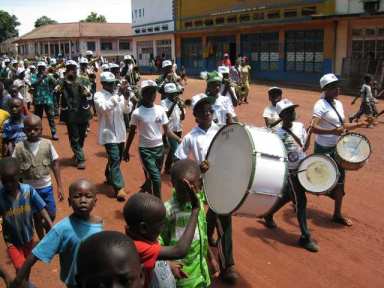We used to call them sects. They are a bewildering collection of over 10,000 independent “Christian” church denominations in Africa. As their proper name, “African Instituted Churches”, suggests, they are defined by being founded by an Africa and not by a missionary.
They are the growing segment of the church in Africa. Denominations founded by missionaries are stagnating or shrinking while the AICs are growing and multiplying. Is this good or bad? Do these African churches teach the truth? Do they lead people to Christ or away from him? The answer is an ambiguous “yes and no”. Their beliefs range from encouraging, to those I could live with, to those I find strange, to the completely unacceptable.
One thing is for sure, some of the AICs are quite exotic in their forms of worship, and therefore interesting. When we were assigned to Côte d’Ivoire I came in contact with the Church of the Prophet William Wadé Harris, called the Harrist Church for short. Everyone dressed in white, they had a fancy procession to and from the church before and after the service, and the head man was called a Prophet. It was fun to visit their Sunday afternoon services.
When we were in Congo, I met the Kimbanguist Church, founded by Simon Kimbangu in the Congo. With 5.5 million followers, it may be the largest AIC in Africa. I was in a town in Congo one day when a Kimbanguist parade came down the street complete with brass band, banner, and uniforms. They were celebrating the birthday of the founder’s wife even though she was deceased. Apparently it has become an important day on the church calendar. After the founder died, the leadership of the Kimbanguist church declared that the founder was the Holy Spirit – a doctrine denounced by other churches in Congo. Apparently, not everyone in the Kimbanguist church follows this doctrine and some are working to change it.
The big debate is how to respond to the growth of the AICs. Denounce them? Separate from them? Work with them? The debate is interesting, especially because there are strong reform movements in some of the stranger AICs. Here in Ghana a special Bible school was set up for the AICs and there are mixed opinions as to whether that was a good idea. It appears to have bolstered reform movements in some of the stranger AICs.
As a Bible translator, I have the luxury of having a simple answer to guide my actions toward the AICs – give them the Bible! One of the successes of the reformation was giving people the Scriptures so that they could know when clergy were leading them astray. The Harrist church had congregations in many of the places our group was doing Bible translation in Côte d’Ivoire. They were often the most avid users of the translated Scriptures. That can only be good.
![]()
![]()
![]()







